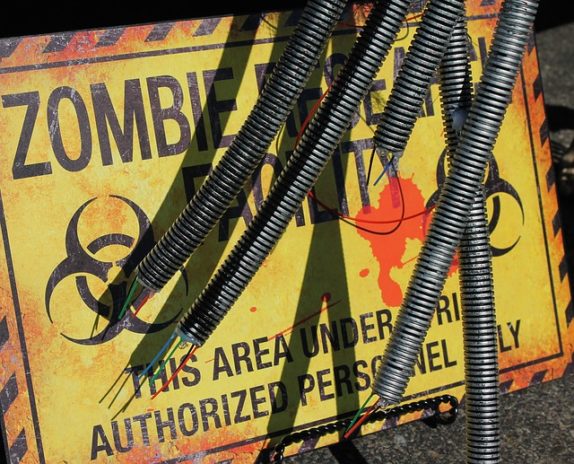
April 10, 2017; New York Times
It’s all very confusing for criminal justice advocates, who on the one hand are watching the federal government re-opt into expensive and substandard private prisons and on the other see the state of New York selling off its prison sites to get them permanently out of circulation. The old adage is, of course, that if you don’t render the buildings in question inoperable as prisons, they will at some point revert to that purpose. Better that they be repurposed—say, as a zombie theme park.
At a state prison here that closed in 2014, a businessman from Florida envisions an entertainment complex with a film studio, a concert venue and a theme park where visitors could battle zombies or play superheroes.
A potential bidder salivates at this prison’s razor-topped fencing, century-old buildings, and peeling paint. “This is great,” businessman William Browning enthuses about the prison’s solitary confinement area. “The theme park would be nothing like Disney or Universal. Zombies are something the market has become obsessed with. We’ll dedicate an entire section of the property to scenarios where people can use survival tactics to dominate the world during a zombie apocalypse.”
Transforming the prisons has to do with more than the offloading of useless (to the state) buildings and all the costs that go with them. The closings removed jobs from local rural economies.
Of the 13 closed prisons, 10 are upstate and New York has sold three of them. Only one of them—the former Mid-Orange Correctional Facility—has been transformed into a new venture. The prison has been turned into the Warwick Valley Office and Technology Corporate Park, though so far just one business, a youth athletic training facility, has opened.
Sign up for our free newsletters
Subscribe to NPQ's newsletters to have our top stories delivered directly to your inbox.
By signing up, you agree to our privacy policy and terms of use, and to receive messages from NPQ and our partners.
But “they’re in the middle of nowhere,” said Peter Bauer, the executive director of Protect the Adirondacks, an environmental group. “It’s going to be a challenge to come up with creative and adaptive reuses of these facilities.”
Indeed:
A plan to convert one former prison, Camp Gabriels, which is about an hour’s drive south of the Canadian border, into a summer camp for Orthodox Jewish boys has run into problems because the state land lies within the Adirondack Forest Preserve and the sale of the property would require amending the state Constitution.
State Senator Betty Little, a Republican whose district hosts three empty prisons, would apparently rather see them filled back up and returned to their original purposes, even if they are not strictly speaking needed. “When the decision is made to close a prison in a rural community, that community loses hundreds of jobs that aren’t going to be absorbed by the private sector,” Ms. Little said. “It’s a huge blow that someone from a populated area of New York State wouldn’t understand.”
The sad fact is that this is how these facilities were sold to localities—as economic development projects—and that makes the discussion around their closing just a little bizarre. As we have observed with the private prisons, rationalizing over-incarceration as a profitable market or preferred source of income is a moral abomination that should be avoided at all costs.—Ruth McCambridge













